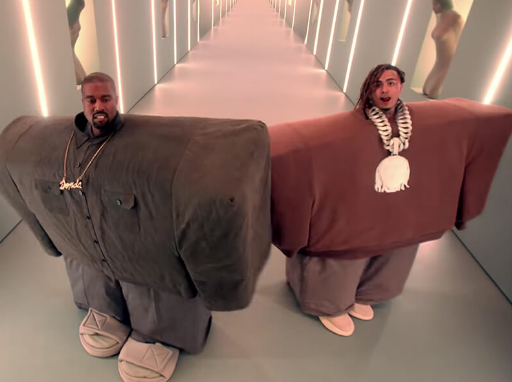
Photo courtesy of Vogue In the music video for the song “I love it,” Kanye West and Lil Pump dress up while spewing an obscene amount of misogynistic lyrics.
Hip hop normalizes misogyny in the mainstream
Against the backdrop of protests, petitions, and an increasingly politically active teen demographic, the new decade has spurred the progression of equal rights in the country. Centuries-long institutions have been challenged for being sexist, but the world’s most blatantly misogynistic subculture, hip-hop, has remained uncriticized. Ever since hip-hop’s creation, it has rewarded artists for objectifying women, and doing so has become a staple of the genre and the daily lives of rappers. In 2021, it is inappropriate, backward, and erases decades of civil rights advancements made by women.
The most disturbing display of toxic masculinity is shown through the lives of rappers, where their lyrics spill over into real life. Future, the pioneer of the famous “for the streets” label to describe unloyal women, has since had children with eight women. When a man who has had children with eight different women becomes the poster child for fighting unloyalty in relationships, it shows the frightening influence of hip-hop in silently degrading the rights of women and the power imbalance between men and women in a society that has come to love hip-hop.
In modern America, girls grow up listening to music that objectifies them, and, thus, grow up with unrealistic body images in order to try and fit the perfect description of a woman in hip-hop. This is projected to a grand scale through female hip-hop artists, most of whom grew up listening to hip-hop, and are now rapping about their ability to control men through using their body. When “WAP” by Cardi B rode the airwaves in 2020, it was the result of a whole generation of women having these standards forced onto them, and, even making a song, marking their conformity to the patriarchy that ultimately only sees them as things of pleasure.
Most hip-hop fans see this as only a form of creative expression in an age where artistic control is so broad. However, if the only creative output an artist can put out is sexism, maybe they should stop making art. Using the same ideas and lyrics over and over again, especially if it attacks half the planet, is lazy at best and extremely bigoted at worst.
Students are increasingly active in social issues, but supporting these artists while campaigning under the banner of equal rights is hypocritical and counterintuitive. Students should take a more active voice in combating casual sexism in their daily entertainment, and rethink who they want to support.